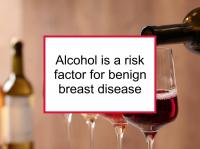A new study has reported that teenage girls with a family history of breast cancer who consume seven alcoholic drinks per week double their risk of benign breast disease, which in turn increases their subsequent risk of breast cancer. The study was designed to investigate risk factors for benign breast disease among girls with relatives with breast cancer.
Breast cancer patients are rightly concerned about how their daughters can reduce their risk of breast cancer. Since benign breast disease is a known risk factor for breast cancer, reducing exposure to risk factors for it might translate into lower risk of breast cancer.
Study design
The study included participants in the Growing Up Today Study (GUTS), which enrolled females aged nine to 15 years in 1996. Participants completed annual questionnaires from 1996 to 2001, then every other year through 2007. The surveys included questions concerning alcohol consumption, age at first period, height, and body mass index (BMI), among others. Peak height growth velocity (PHV), which is a measure of the maximum rate of increase in height during a growth spurt, was estimated from the height data.
Participants were asked to report whether they had been diagnosed with biopsy-confirmed benign breast disease on the 2005 and 2007 questionnaires (the women were then 18 to 27 years old). A total of 67 of the women indicated that they had been diagnosed with biopsy-confirmed benign breast disease whereas 6,741 reported no benign breast disease. The mothers of study participants also were asked to report their own history of biopsy-confirmed benign breast disease and breast cancer, as well as breast cancer in their own mothers (grandmothers of participants) and sisters (aunts).
Study results
Study participants whose mothers or aunts had been diagnosed with breast cancer were found to be 2.34 times more likely to be diagnosed with benign breast disease than participants without such a family history. Participants whose mothers had been diagnosed with benign breast disease were also more likely to develop benign breast disease.
Adolescents with a family history of breast cancer (mother, aunt, or grandmother) who consumed seven drinks per week had 2.28 times the risk of benign breast disease compared to those who did not drink. Participants whose mother or aunt had been diagnosed with breast cancer experienced greater risk of benign breast disease with greater growth spurts. Among girls with no family history of breast cancer, benign breast disease risk appeared to be related to other factors such as childhood BMI, adolescent waist circumference, and adult height.
The authors conclude that adolescents with a family history of breast cancer might reduce their risk by avoiding alcohol. Different risk factors were observed among girls with a family history compared to girls with no family history, possibly reflecting different causes of breast cancer.
